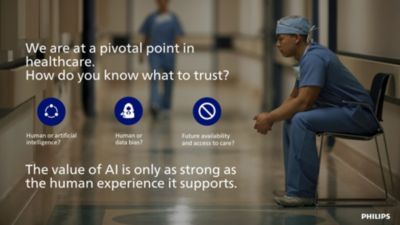Philips Leads AI Transformation in Healthcare, as we step into a new era of patient care
- Jul 15, 2025
- 3 minute read
Healthcare systems worldwide are facing significant challenges in delivering efficient, high-quality care. Aging populations, the increasing prevalence of chronic diseases, and persistent staff shortages are straining already overburdened systems. These pressures often lead to delays in care, negatively impacting patient well-being and potentially exacerbating health conditions.

Artificial intelligence (AI) and informatics are increasingly seen as crucial tools to address these challenges, enhance the capabilities of healthcare professionals, boost capacity, and improve access to care. Healthcare professionals believe that AI can enable their departments to serve more patients, more effectively, according to this year’s Future Health Index [1] report, the largest global survey of its kind. Commissioned by Philips, FHI 2025 indicates strong optimism among healthcare professionals about AI's potential to improve patient outcomes [2], with 79% of health professionals optimistic that AI will improve patient outcomes, but many concerns about bias and reliability remain. Without trust, the full promise of AI in healthcare cannot be realised.
At the recently held Digital Health Festival in Melbourne, Australia, and the Healthcare AI Summit in Wellington, New Zealand, the challenges of AI adoption were highlighted, noting trust and acceptance of AI, its use and its implications for better patient care were openly discussed and challenged. The need to ensure AI adoption and implementation sits within a defined governance structure to enable guardrails to protect patient privacy and ensure appropriate use was highlighted as areas for key development in both Australia and New Zealand.
Philips are driving AI Innovation
Philips is leading the way in AI innovation with a clear mission: to enhance lives through impactful health technology. By harnessing AI, Philips personalises, predicts, and streamlines healthcare. This includes improving image quality in diagnostic imaging and assisting clinicians in making quicker more accurate decisions while lessening cognitive load [3]. In hospitals, Philips integrates AI into various healthcare systems, providing real-time insights, early detection of patient deterioration, and improved chronic disease management. This not only enhances patient outcomes but also alleviates pressure on healthcare providers.
AI also fuels Philips’ drive for operational efficiency—optimising hospital workflows, equipment maintenance, and resource allocation. Through ongoing research and collaborations with hospitals, universities, and tech innovators, Philips demonstrates its commitment to ethical and responsible AI development. Ultimately, Philips’ purpose-driven approach positions AI as a transformative tool for promoting healthier lives and creating a more sustainable, effective healthcare system. Each advancement aligns with the company’s goal to deliver better care to more people, aiming to improve 2.5 billion lives annually by 2030.
Philips Innovation and Capability -Transforming Care Delivery
Designed to modernise and unify care delivery across the healthcare ecosystem, Philips’ AI-driven solutions, part of its healthcare informatics portfolio, are already trusted by 95 of the top 100 hospitals and health systems in the United States, according to Becker's Hospital Review rankings. Tools such as eCareManager, Capsule Surveillance, and the Radiology Operations Command Center offer near-real-time data integration and continuous patient monitoring, to empower care teams with meaningful insights and support more personalised, efficient, and connected care.
“We recognise the value of AI created by many across the sector and our open approach to building connected ecosystems creates a foundation for health providers to leverage a rapidly evolving technology available now and in the future”, stated Dan Ball, Head of Healthcare Informatics APAC, Japan & Indian Subcontinent at Philips.
In imaging, Philips’ Enterprise Imaging [4] and AI Manager [5] offerings enable rapid visualisation, collaboration, and reporting—bringing efficiencies that are vital in high-demand departments such as radiology and pathology. These solutions demonstrate Philips' commitment to providing tools that seamlessly integrate into existing healthcare workflows.
The Philips IntelliSite Pathology Solution (PIPS) [6] digitises pathology workflows, enabling faster, more efficient diagnoses and interdisciplinary collaboration [7]. Philips’ technologies integrate with existing equipment and IT systems, safeguarding previous investments while elevating operational capabilities. From radiology and pathology to urology and critical care, its platforms unify data, streamline workflows, and drive smarter, faster decision-making.
Enhancing Workflows and Clinical Decision-Making
A vendor-neutral platform, Philips’ Capsule Medical Device Information Platform automates the transfer of medical device data across all hospital departments [8] directly into electronic patient records (EPRs). It integrates data live streamed from more than 1,000 medical devices [9], streamlining workflows and freeing up clinicians to focus on patient care. At Cambridge University Hospitals, automating data capture resulted in annual Critical Care staff time savings equivalent to £2.6 million [10]. This approach has been "key to enhancing data accuracy whilst at the same time freeing up our nurses for more patient-centred care”, said Dr Afzal Chaudhry, Chief Medical Information Officer at Cambridge University Hospitals [11].
Philips also provides AI-powered clinical decision support tools and patient monitoring systems for acute care settings, where timely and accurate clinical decision-making is paramount. Capsule Surveillance [12], for example, continuously analyses live-streaming data from nearly any patient device [13], providing clinicians with real-time insights into patient conditions. Predictive AI models help clinicians identify and prioritise patients based on their individual needs and potential risks. These solutions facilitate remote monitoring and virtual care, extending the capacity of care teams and enabling them to manage a larger number of patients effectively.
Radiology departments also benefit from Philips' workflow orchestration solutions, which streamline the radiology process from image acquisition to reporting. The Radiology Operations Command Centre [14], for example, connects technologists and imaging experts regardless of their location, optimising workflows, reducing turnaround times, and enhancing collaboration among radiology teams.
Trust in AI Implementation
“Our approach is not about AI for AI's sake, or a closed ecosystem where we try to be all things to all people”, stated Ball. “We believe in implementing meaningful AI capabilities fully embedded within efficient, relevant workflow at the point of care, delivering actionable insights where and when they are needed rather than diverting clinicians from their workflow to employ it in their practice”.
Philips recognises the challenges of implementation and collaborates with partners worldwide to support their AI adoption journey. By partnering with clinical teams, Philips AI tools empower clinicians to focus on patient care by alleviating the administrative and operational pressures faced by understaffed hospitals ensuring the ethical use of AI in clinical practice. As the FHI report suggests, artificial intelligence has the potential to reimagine care, improve patient outcomes, and ease the burden on health professionals, but only if it is built on a foundation of trust.
Sources
https://www.philips.se/healthcare/technology/clinical-decision-support-solutions
https://www.philips.com.au/healthcare/suite-of-solutions/enterprise-imaging#slide_key_capabilities
https://www.philips.com.au/healthcare/product/839051/ai-manager
https://www.documents.philips.com/assets/20260130/6a78198741934f119483b3e200a2593f.pdf
https://www.documents.philips.com/assets/20260130/4dfeb4387d144c69a268b3e200a259dc.pdf
https://www.documents.philips.com/assets/20260130/4dfeb4387d144c69a268b3e200a259dc.pdf
https://www.usa.philips.com/healthcare/product/NOCTNSURV/capsule-surveillance
https://www.philips.com.au/healthcare/product/HC808001/radiology-operations-command-center
